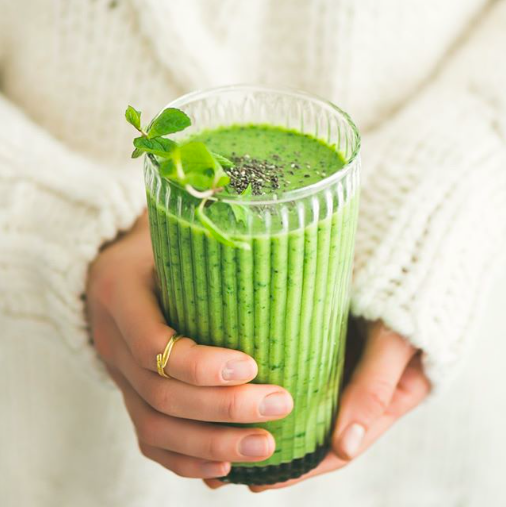Discover the unparalleled benefits of Whole-Leaf Moringa Powder, your natural superfood solution for enhanced wellness. Packed with vitamins, minerals, and antioxidants, Moringa Powder supports immune health, energy levels, and overall vitality. Elevate your nutrition naturally with our organic, pure Moringa Powder.
Introduction to Moringa
Moringa Oleifera, commonly known as Moringa, is a nutrient-rich plant native to parts of Africa and Asia. With its remarkable nutritional profile and versatility, Moringa has been used for centuries in traditional medicine to treat a myriad of health conditions. Today, it’s celebrated as a superfood, with whole-leaf Moringa powder leading the charge for a natural, healthful supplement choice.
Table of Contents
Benefits of Moringa Powder
- Rich Nutritional Profile: Moringa powder is packed with vitamins, minerals, and amino acids. It contains significant amounts of vitamins A, C, and E, calcium, potassium, and protein, making it a potent source of nutrients that are essential for maintaining good health.
- Antioxidant Properties: The powder is rich in antioxidants such as quercetin and chlorogenic acid. These compounds help protect the body against free radicals, molecules that can cause oxidative stress, cell damage, and inflammation.
- Supports Heart Health: Moringa powder has been linked to reduced cholesterol levels, which is a key factor in preventing heart disease. Its antioxidant properties also aid in protecting the heart by preventing the oxidation of cholesterol in the arteries.
- Anti-inflammatory Effects: The isothiocyanates found in Moringa are known for their anti-inflammatory properties. Chronic inflammation is associated with many chronic health conditions, and incorporating Moringa powder can help reduce inflammation in the body.
- Enhances Digestive Health: Rich in fiber, Moringa powder can help improve digestive health. Fiber is essential for maintaining a healthy digestive system, preventing constipation, and supporting good gut health.
- Boosts Energy Levels: Moringa is known for its ability to boost energy levels naturally without causing any sugar crashes, making it a healthier alternative to caffeine and other stimulants.
- Supports Brain Health: The high levels of antioxidants in Moringa powder can contribute to brain health. Its neuro-enhancer activities are beneficial in managing cognitive disorders, and it also helps in mood stabilization, memory, and brain health.
- Improves Skin and Hair Health: Moringa powder’s high vitamin A and E content contribute to healthy skin and hair. Vitamin A is essential for reducing skin aging and acne, while Vitamin E protects against skin damage caused by the sun and pollution.
- Supports Weight Loss: Moringa powder can support weight loss efforts due to its low-fat and low-calorie content. Its high fiber content also helps in keeping you full for longer periods, reducing the urge to snack on unhealthy foods.
- Blood Sugar Regulation: Some studies have shown that Moringa powder can help lower blood sugar levels, making it beneficial for people with diabetes. Its chlorogenic acid content helps with sugar absorption in cells.
- Strengthens Immunity: The high vitamin C content in Moringa powder strengthens the immune system, helping the body ward off colds and infections more effectively.
- Detoxifies the Body: Moringa has detoxifying properties, helping in cleansing the body of toxins, and improving liver function.
- Bone Health: Rich in calcium and phosphorus, Moringa powder helps in maintaining healthy bones and preventing osteoporosis.
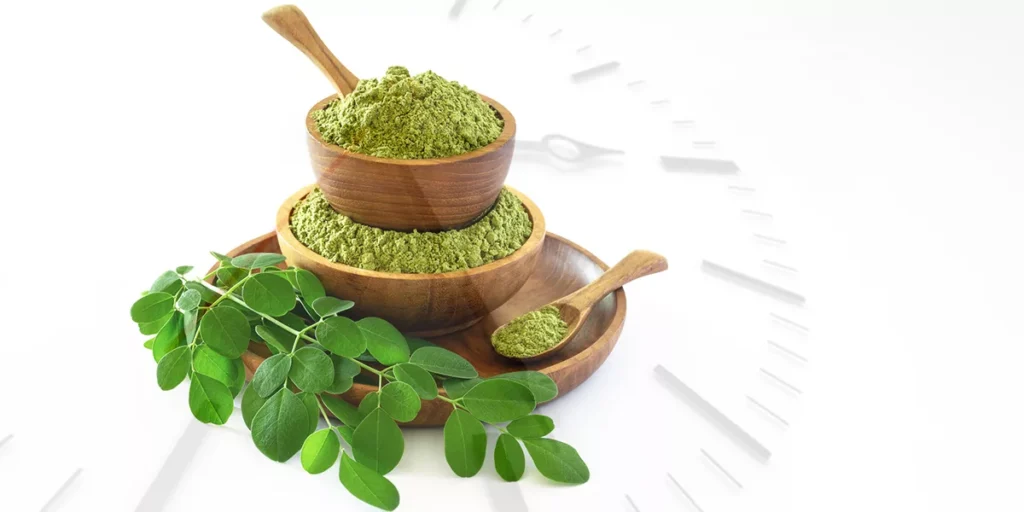
Why Whole-Leaf Moringa Powder?
- Maximized Nutrient Retention: The process of making whole-leaf Moringa powder involves drying and grinding the leaves without removing any part of them. This method ensures that the natural vitamins, minerals, antioxidants, and amino acids are preserved to the fullest extent. Unlike extracts or supplements that may isolate certain nutrients or compounds, whole-leaf powder provides a comprehensive range of benefits found in the Moringa leaf.
- Higher Fiber Content: Whole-leaf Moringa powder retains the leaf’s fibrous content, which is beneficial for digestive health. Fiber aids in digestion, helps regulate blood sugar levels, and contributes to a feeling of fullness, which can assist in weight management efforts.
- Pure and Natural: Choosing whole-leaf powder ensures you’re consuming Moringa in its most natural form. This minimizes the exposure to processing chemicals and additives that might be used in creating extracts or concentrates. For those seeking a clean, organic supplement, whole-leaf Moringa powder is an excellent option.
- Environmental Sustainability: The production of whole-leaf Moringa powder is typically more sustainable than other forms of Moringa products. It requires less processing and refinement, which means lower energy consumption and a smaller carbon footprint. Supporting whole-leaf Moringa powder production can contribute to more environmentally friendly agricultural practices.
- Cost-Effectiveness: Given the minimal processing involved, whole-leaf Moringa powder can be more cost-effective than other Moringa supplements. Consumers receive a product that is not only higher in nutritional value but also more economical in the long run.
- Versatility in Use: Whole-leaf Moringa powder is incredibly versatile and can be easily incorporated into a variety of dishes, beverages, and even skincare routines. Its mild flavor makes it a nutritious addition to smoothies, soups, teas, and even baked goods, allowing for a seamless integration into daily diets.
- Holistic Health Benefits: Consuming Moringa in its whole-leaf form ensures that you benefit from the synergistic effect of its nutrients. This holistic approach can enhance the plant’s anti-inflammatory, antioxidant, and immune-boosting properties, providing a more balanced and effective support to overall health.
- Promotes Ethical Farming Practices: Many whole-leaf Moringa powder producers emphasize ethical and sustainable farming practices, including organic certification. By choosing these products, consumers can support small-scale farmers and sustainable agriculture, contributing to positive social and environmental impacts.
How to Incorporate Moringa Powder into Your Diet
- Smoothies and Juices: Adding a teaspoon or two of Moringa powder to your morning smoothie or juice is an easy way to start your day with a nutrient boost. Its mild, earthy taste blends well with fruits and vegetables, making it a seamless addition.
- Teas and Beverages: Stir Moringa powder into hot water to make a simple Moringa tea, or add it to your favorite herbal teas. You can also mix it into warm milk (dairy or plant-based) with a bit of honey for a comforting beverage.
- Soups and Stews: Moringa powder can be stirred into soups and stews just before serving. It adds nutrients without altering the taste significantly, especially in rich or heavily seasoned dishes.
- Baking: Incorporate Moringa powder into your baking recipes. It can be added to bread, muffins, pancakes, and other baked goods. Start with a small amount, as its earthy flavor can be strong.
- Salad Dressings: Mix Moringa powder into salad dressings or sprinkle it directly on salads. It pairs well with vinaigrettes or creamy dressings, adding a nutritional punch to your greens.
- Sprinkled Over Meals: Simply sprinkle Moringa powder over your finished dishes, such as rice, pasta, or vegetables, much like you would with a seasoning. This method is an effortless way to enrich your meals with extra vitamins and minerals.
- Energy Bars and Snacks: For homemade energy bars, granola bars, or energy balls, Moringa powder can be a key ingredient. It complements nuts, seeds, and dried fruits, contributing to the nutrient density of these snacks.
- Yogurt and Breakfast Bowls: Stir Moringa powder into your morning yogurt or oatmeal. Add some fruits and nuts for a wholesome and nutritious breakfast bowl that’s energizing and satisfying.
- Homemade Sauces and Pestos: Moringa powder can be blended into sauces and pestos, adding both nutrition and color. It works well in green pesto, mixed with basil, parsley, or other greens, along with nuts and cheese.
- Smoothie Bowls: Create a vibrant and healthy smoothie bowl by blending Moringa powder with your choice of fruits, vegetables, and liquids. Top with sliced fruits, nuts, seeds, and a drizzle of honey for a nutrient-rich meal.
- Protein Shakes: If you’re into fitness and looking for ways to enrich your post-workout nutrition, add Moringa powder to your protein shakes. It will boost the vitamin and mineral content without compromising the taste.
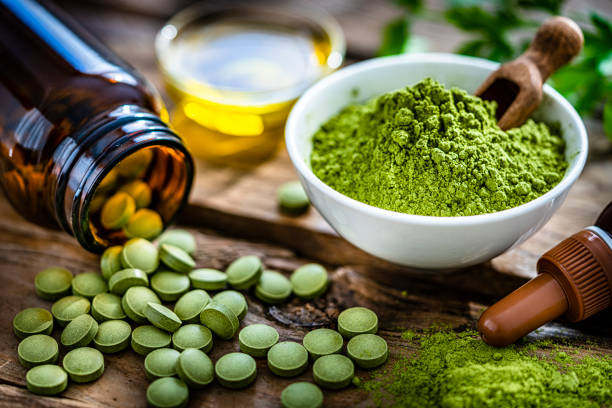
Choosing the Right Moringa Powder
- Organic Certification: Look for Moringa powder that is certified organic. This ensures that the Moringa trees were grown without the use of synthetic pesticides, herbicides, or fertilizers, which can be harmful to your health and the environment.
- Source: The origin of the Moringa powder is important. Moringa grown in its native environments, such as parts of Africa, India, and Southeast Asia, is likely to have a richer nutrient profile due to the optimal soil and climate conditions. Research the brand’s sourcing practices to ensure they are ethical and sustainable.
- Processing Method: The best Moringa powder is made by drying the leaves at low temperatures and then grinding them into a powder. This process helps to preserve the delicate nutrients. Avoid brands that use high heat or unnecessary chemicals in their processing, as these methods can degrade the nutritional content.
- Purity: Pure Moringa leaf powder should be just that—100% Moringa leaves, with no fillers, additives, or other ingredients. Check the label for any added ingredients and opt for the product that offers pure, unadulterated Moringa powder.
- Color and Smell: High-quality Moringa powder should have a vibrant green color and a fresh, earthy smell. A dull color or an off smell can indicate poor processing methods or that the powder is old and has lost its nutritional potency.
- Packaging: Look for Moringa powder that is packaged in airtight, opaque containers. Exposure to light, air, and moisture can degrade the nutrients in Moringa powder, so proper packaging is essential to maintain its quality and shelf life.
- Lab Testing: Some companies go the extra mile by conducting third-party lab testing on their Moringa powder for heavy metals, bacteria, and other contaminants. If available, choose a brand that provides transparent lab test results to ensure the safety and purity of their product.
- Reviews and Reputation: Research the brand and read customer reviews to gauge the effectiveness and quality of their Moringa powder. A brand with a good reputation and positive feedback from users is more likely to offer a high-quality product.
- Certifications and Awards: Certifications like Non-GMO, Gluten-Free, or Vegan, and any industry awards can also indicate a high-quality product that meets stringent standards.
- Price: While price should not be the sole determining factor, be wary of Moringa powder that is significantly cheaper than others. A low price can sometimes indicate poor quality or unethical production practices. Invest in a product that offers a good balance between quality and cost.
Preparation Tips and Dosage
Preparation Tips
- Start with Small Amounts: Moringa powder has a potent, earthy flavor that can be overwhelming if used in large quantities initially. Start with a small amount, such as half a teaspoon, and gradually increase as you get accustomed to the taste.
- Mix Well: Moringa powder can clump when mixed with liquids. To avoid this, first mix it with a small amount of hot water to form a paste, then add it to your dishes or beverages.
- Pair Wisely: Pair Moringa powder with strong flavors to mask its taste if you find it too strong. It blends well with citrus juices, pineapple, bananas, or ingredients like ginger and honey in smoothies.
- Use in Cooking: You can add Moringa powder to soups, stews, and sauces after the cooking process to preserve its nutritional content. Heat can reduce some of its vitamin content, especially vitamin C.
- Baking with Moringa: When baking, you can replace a small portion of flour with Moringa powder to enrich your baked goods with nutrients without significantly altering the taste.
- Storage: Keep Moringa powder in a cool, dry place away from direct sunlight. An airtight container is best to prevent moisture from clumping the powder and to preserve its freshness and potency.
Dosage Recommendations
- General Wellness: For general health benefits, starting with 1 to 2 teaspoons of Moringa powder daily is a good guideline. This can provide a significant boost in vitamins, minerals, and antioxidants.
- Specific Health Goals: If you have specific health goals, such as managing blood sugar levels or supporting weight loss, consulting with a healthcare provider for personalized dosage advice is crucial. They can recommend adjustments based on your health status and nutritional needs.
- Gradual Increase: If you tolerate Moringa well and wish to increase your intake for enhanced benefits, do so gradually. Monitor your body’s response to ensure you don’t experience any adverse effects.
- Maximum Dosage: It’s generally recommended not to exceed 2 tablespoons (about 14 grams) of Moringa powder per day. High doses can lead to gastrointestinal discomfort or other side effects in some individuals.
- Listen to Your Body: Individual tolerance can vary. Pay attention to how your body responds to Moringa powder and adjust your dosage accordingly. If you experience any negative side effects, reduce the amount or consult with a healthcare professional.
Important Considerations
- Pregnancy and Breastfeeding: Women who are pregnant or breastfeeding should consult a healthcare provider before adding Moringa powder to their diet, as certain compounds in the plant may not be advisable in high doses during these periods.
- Medication Interactions: If you’re on medication, especially for diabetes or blood pressure, consult with your doctor before incorporating Moringa powder, as it may affect the potency of your medications.
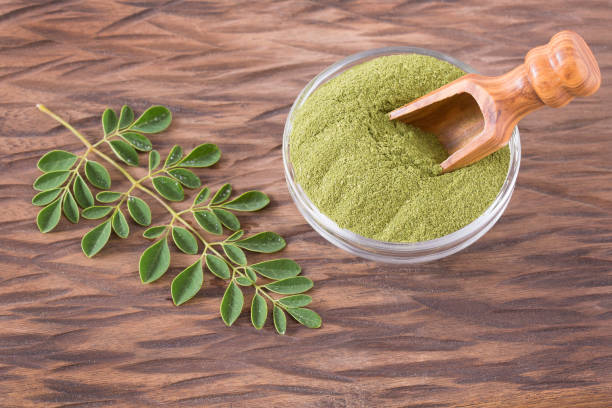
Safety and Side Effects
Safety Considerations
- Pregnancy and Breastfeeding: While Moringa leaves are eaten as a food in many parts of the world, there is insufficient evidence about the safety of using Moringa in medicinal amounts during pregnancy and breastfeeding. Some parts of the Moringa tree, such as the root, bark, and flowers, have substances that might contract the uterus. Pregnant women should avoid taking high doses of Moringa powder and stick to food amounts.
- Blood Sugar Levels: Moringa powder has been shown to lower blood sugar levels. While this can be beneficial for people with diabetes, it might cause blood sugar to drop too low if consumed in conjunction with diabetes medication. Monitoring blood sugar levels closely and adjusting medication as necessary is important.
- Blood Pressure: Moringa has properties that may lower blood pressure. This could be a concern for individuals already taking blood pressure medication, as it might result in blood pressure becoming too low.
- Thyroid Function: There is some evidence that Moringa leaf can affect thyroid function, although this has primarily been observed in animal studies. People with thyroid conditions should use Moringa powder cautiously and consult healthcare providers.
Potential Side Effects
- Gastrointestinal Issues: High doses of Moringa powder may lead to gastrointestinal side effects such as diarrhea, nausea, and stomach upset. This is often due to the high fiber content and the body’s adjustment to the intake of Moringa.
- Allergic Reactions: Although rare, some individuals may experience allergic reactions to Moringa powder. Symptoms could include rash, itching, or swelling. Anyone experiencing these symptoms should discontinue use and consult a healthcare provider.
- Interactions with Medications: Because Moringa powder can affect blood sugar and blood pressure levels, it may interact with medications designed to control these conditions. It’s important to consult a healthcare provider if you’re taking medications for diabetes or hypertension before starting Moringa.
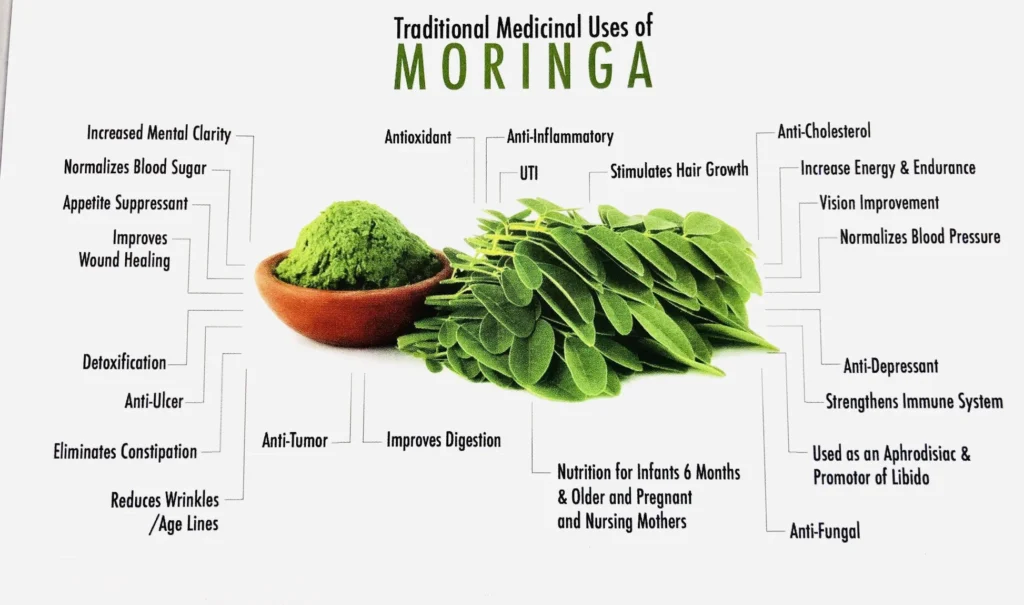
Safe Consumption Practices
- Consult Healthcare Providers: Before adding Moringa powder to your diet, especially if you have existing health conditions or are taking medications, it’s advisable to consult with a healthcare provider. They can provide personalized advice based on your health status.
- Start with Small Doses: To minimize potential side effects, start with small doses of Moringa powder and gradually increase to gauge your body’s tolerance.
- Listen to Your Body: Pay attention to how your body responds to Moringa powder. If you experience adverse effects, reduce your intake or discontinue use.
Moringa Powder for Specific Health Goals
Weight Management
Moringa powder is low in fat and high in fiber, making it an excellent addition to a weight management diet. The fiber content helps promote a feeling of fullness, reducing the urge to snack between meals. Additionally, its high nutrient density can support nutritional needs even in a calorie-restricted diet.
Boosting Energy Levels
Rich in vitamins, minerals, and amino acids, Moringa powder can naturally increase energy levels without the crash associated with caffeine and sugar. Its iron content is particularly beneficial for preventing fatigue, especially in individuals with iron-deficiency anemia.
Supporting Heart Health
Moringa powder contains potent antioxidants and compounds that can help lower blood cholesterol levels, reducing the risk of heart disease. Its anti-inflammatory properties also contribute to maintaining healthy blood vessels, supporting overall cardiovascular health.
Enhancing Immune Function
With its high vitamin C content, Moringa powder can strengthen the immune system, making the body more resistant to infections and diseases. The various antioxidants in Moringa also support the immune system by combating oxidative stress.
Regulating Blood Sugar Levels
Several studies suggest that Moringa powder can help lower blood sugar levels, making it beneficial for people with diabetes or those at risk. Its chlorogenic acid content helps with the slow release of sugar into the bloodstream, preventing sugar spikes.
Improving Digestive Health
Moringa powder’s fiber content aids in digestion and can help prevent constipation. Its antibacterial properties also support a healthy gut microbiome, essential for good digestive health.
Anti-inflammatory Benefits
Chronic inflammation is linked to many health issues, including arthritis, respiratory problems, and cardiovascular diseases. Moringa powder’s anti-inflammatory properties can help reduce inflammation in the body, providing relief from symptoms and reducing the risk of related diseases.
Bone Health
Moringa powder is a good source of calcium and magnesium, essential minerals for bone health. Regular consumption can support bone density and structure, potentially reducing the risk of osteoporosis and fractures.
Mental Clarity and Mood Improvement
Moringa powder contains compounds that can support brain health, including improving mood and cognitive function. Its antioxidant properties protect the brain from oxidative stress, while the high magnesium content can improve mood and reduce stress.
How to Use Moringa Powder for Health Goals
To achieve specific health goals, incorporating 1-2 teaspoons of Moringa powder into your daily diet can be beneficial. It can be added to smoothies, juices, teas, soups, or even sprinkled on salads. However, it’s important to note that Moringa powder should complement a balanced diet and healthy lifestyle, not replace other nutritional needs or medical treatments.
Skin and Hair Health
The high levels of vitamins A and E in Moringa powder can have a positive impact on skin and hair health. Vitamin A is crucial for healthy skin cell production, while Vitamin E provides antioxidant protection against UV radiation and environmental pollutants.
Comparing Moringa to Other Superfoods
Moringa vs. Spirulina
- Nutrient Density: Both Moringa and Spirulina are highly nutritious. Moringa is rich in vitamins A, C, and E, calcium, potassium, and proteins. Spirulina, a type of blue-green algae, boasts a high protein content, B vitamins, iron, copper, and a unique antioxidant called phycocyanin.
- Health Benefits: Moringa is known for its anti-inflammatory properties, ability to lower blood sugar levels, and support heart health. Spirulina is celebrated for its immune-boosting properties, potential to detoxify heavy metals, and its role in lowering LDL and triglyceride levels.
- Usage: Moringa can be more versatile in usage, easily added to smoothies, teas, and meals. Spirulina has a distinct taste that might be less palatable for some, often used in smoothies or tablets.
Moringa vs. Turmeric
- Active Compounds: Moringa is packed with vitamins, minerals, and antioxidants. Turmeric’s primary health benefits come from curcumin, a compound with powerful anti-inflammatory and antioxidant properties.
- Health Benefits: Both superfoods offer anti-inflammatory benefits, but turmeric is particularly known for its role in reducing inflammation and pain associated with conditions like arthritis. Moringa, on the other hand, offers a broader range of nutrients, supporting overall nutrition.
- Usage: Turmeric is commonly used in cooking and as a supplement. Moringa’s leaf powder form makes it a more versatile addition to a variety of dishes and beverages.
Moringa vs. Chia Seeds
- Nutritional Profile: Chia seeds are a good source of omega-3 fatty acids, fiber, antioxidants, and minerals. Moringa excels in providing high levels of vitamins and minerals, including iron and calcium.
- Health Benefits: Chia seeds are known for promoting heart health, improving digestive health, and stabilizing blood sugar levels. Moringa’s benefits span from enhancing nutritional intake to supporting immune function and reducing inflammation.
- Usage: Chia seeds can be used in puddings, baked goods, and as a thickener in recipes. Moringa powder is easily incorporated into smoothies, soups, and sauces.
Moringa vs. Matcha
- Antioxidants: Matcha, a type of green tea, is rich in catechins, particularly EGCG (epigallocatechin gallate), known for its cancer-fighting properties. Moringa also contains a high level of antioxidants, though different types, such as quercetin and chlorogenic acid.
- Health Benefits: Matcha is celebrated for its ability to enhance cognitive function, boost metabolism, and improve heart health. Moringa offers a broader nutritional profile, supporting various aspects of health from blood sugar regulation to improved digestion.
- Usage: Matcha is typically consumed as a beverage, either as tea or in lattes. Moringa powder has a wider range of uses in cooking and supplementation.
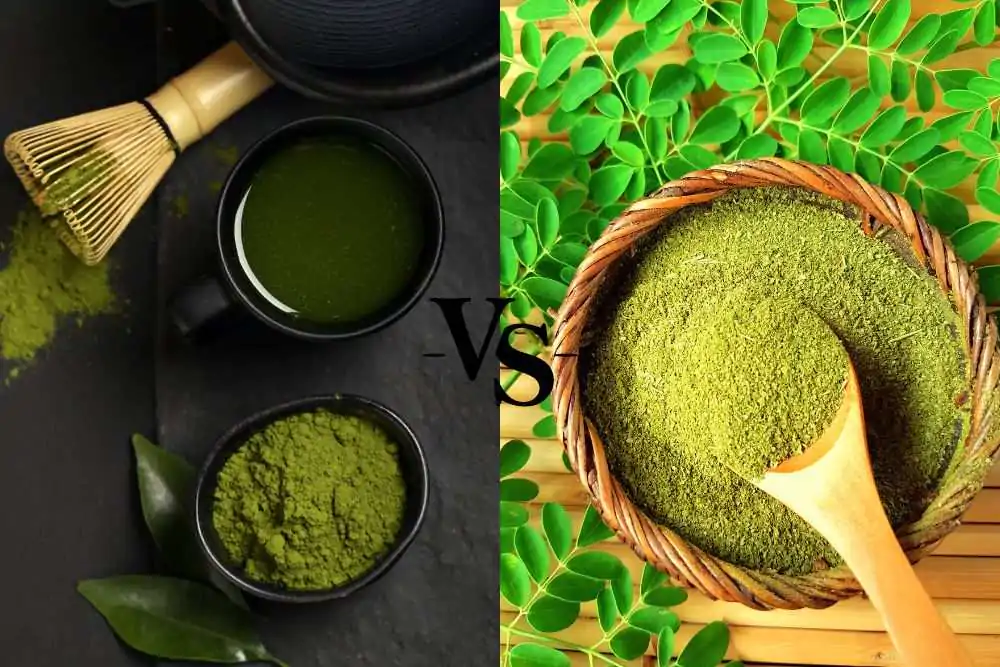
Source to Get Organic Moringa Leaf Powder Capsules
FAQs
- How does Moringa powder compare to fresh Moringa leaves?
- Can Moringa powder help with weight loss?
- Is Moringa powder safe for everyone?
- How long does it take to see benefits from Moringa powder?
- Can I take Moringa powder with other supplements?
Conclusion
Whole-leaf Moringa powder is a powerful, natural supplement that offers a wide range of health benefits. By incorporating it into your diet, you’re not only supporting your health but also sustainable agriculture practices. As research continues to uncover more about this superfood, Moringa stands out as a key player in the future of natural health and wellness.
